Site Search
Displaying results 111 - 120 of 574
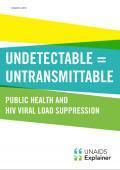
Resource | Publications,
Twenty years of evidence demonstrates that HIV treatment is highly effective in reducing the transmission of HIV. People living with HIV on antiretroviral therapy who have an undetectable level of HIV in their blood have a negligible risk of transmitting HIV sexually.
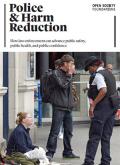
Resource | Guidelines,
Globally, law enforcement officers have grown increasingly frustrated with the limited effectiveness of traditional drug enforcement approaches that find them arresting or imprisoning individuals without significant impact on illicit drug trade or use. This is a briefing for law enforcement personnel around the world on how to incorporate, support, and create space for approaches that aim to increase public safety and health, reduce harm to people who use drugs, and provide law enforcement alternatives to common punitive models.
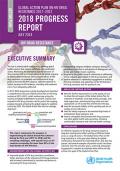
Resource | Publications,
This report summarizes the progress in implementing the Global Action Plan achieved during the first year (2017 to 2018) and the remaining challenges, with specific focus on 45 countries accounting for more than 85% of the total burden of HIV infection.
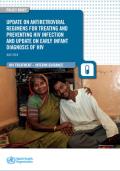
Resource | Laws and Policies,
Since 2016, WHO has recommended tenofovir disoproxil fumarate (TDF) + lamivudine (3TC) (or emtricitabine, FTC) + efavirenz (EFV) 600 mg as the preferred first- line antiretroviral therapy (ART) regimen for adults and adolescents. WHO recommended dolutegravir (DTG) as an alternative option to EFV for first-line ART because of the uncertainty regarding the safety and efficacy of DTG during pregnancy and among people living with HIV receiving rifampicin-based tuberculosis (TB) treatment. In 2016, WHO recommended that HIV virological testing be used to diagnose HIV infection among infants and children younger than 18 months and that ART be started without delay while a second specimen is collected to confirm the initial positive virological test result.
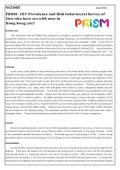
Resource | Fact Sheets,
Men having sex with men (MSM) have continued or emerged to account for a significant proportion of newly acquired HIV infection in many areas around the world, including Hong Kong. The first PRiSM (HIV prevention and risk behavioural survey of men who have sex with men in Hong Kong) study was conducted in 2006. It was the first community-based MSM and HIV study of its kind in Hong Kong. Designed also as a regular public health surveillance programme to track the epidemic and inform intervention, the survey was repeated in 2008 and 2011. Special Preventive Programme of the Department of Health (DH) conducted this fourth round of PRiSM from April to September 2017. The study aims to update on the HIV prevalence among MSM in Hong Kong, and inform on HIV/STIs preventive interventions and the profile of risk behaviours of local MSM.
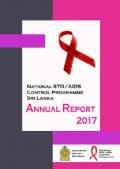
Resource | Publications,
The National STD/AIDS Control Programme (NSACP) of the Ministry of Health, is the main government organization responsible for planning and implementation of the national response to HIV/AIDS in Sri Lanka in collaboration with all stakeholders.
This volume of NSACP annual report summarizes the activities conducted by the NSACP during 2017 and presents the strategic information on STI and HIV collected from all the peripheral STD clinics and ART centers situated island-wide. It is noted with satisfaction that over the years the annual report of NSACP has become a reliable reference document on HIV and STI situation in the country to both the public and the research community.
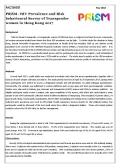
Resource | Fact Sheets,
Male-to-female transgender or transgender women (TGW) has been a neglected and hard-to-reach community, yet various overseas studies have shown that their HIV prevalence can be high. To better study the situation in Hong Kong, Special Preventive Programme of the Department of Health (DH) has included TGW as one distinct at-risk population to be covered in the HIV/AIDS Response Indicator Survey (HARiS, a venue-base survey) since 2014. It is the first time DH included TGW in PRiSM (HIV prevention and risk behavioural survey of men who have sex with men in Hong Kong). As PRiSM is a community-based survey and the participants only need to complete a self-administered online questionnaire, it was hoped that more TGW could be reached. The study aims to update on the HIV prevalence among TGW in Hong Kong, and inform on HIV/STIs preventive interventions and the profile of risk behaviours of local TGW.
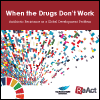
Resource | Publications,
There is a belief that innovation of new antibiotics will out-pace the development and spread of resistant bacteria. However, without rapidly addressing the way antibiotics are currently over- and mis-used, there is no chance of winning this race. Novel antibiotics will continue to play an important role, but they will not be enough. Antibiotics must be seen as a non-renewable resource. And just like in climate change, if this natural resource is exhausted, there will be nothing left for future generations. Managing antibiotic resistance relies on limiting use of antibiotics, discovery of new antibiotics or alternative ways to treat infectious diseases, but also on preventing infections and limiting spread of resistance. There are no quick fixes – antibiotic resistance is a systems failure and thus all sectors need to contribute to a change and jointly securing that antibiotics remain effective.
This report focuses on the Sustainable Development Goals related to poverty, economic growth, inequality, health, food production and the environment.
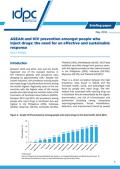
Resource | Publications,
Between 2010 and 2016, Asia and the Pacific registered one of the steepest declines in HIV infections globally, with prevalence rates dropping by approximately 13%. Despite this overall reduction, HIV prevalence among people who inject drugs in Southeast Asia remains among the world’s highest. Regionally, seven of the ten countries with the highest rates of HIV among people who inject drugs are member states of the Association of Southeast Asian Nations (ASEAN).
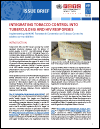
Resource | Fact Sheets,
The Global Fund to Fight AIDS, TB and Malaria has opened up the opportunity to incorporate tobacco control into TB and HIV grants. In line with the 2030 Agenda, the UNDP Strategic Plan 2018-2021, and UNDP’s HIV, Health and Development Strategy 2016-21: Connecting the Dots, UNDP and the Secretariat of the WHO Framework Convention on Tobacco Control (WHO FCTC) have produced this Issue Brief to inform Global Fund applicants on integrating tobacco cessation into Global Fund HIV and TB grants. The Issue Brief outlines how tobacco consumption worsens TB and HIV outcomes and how the integration of tobacco control could increase health benefits and efficiencies. Key approaches and practical options for such integration are outlined, based on a review of research and case studies.





